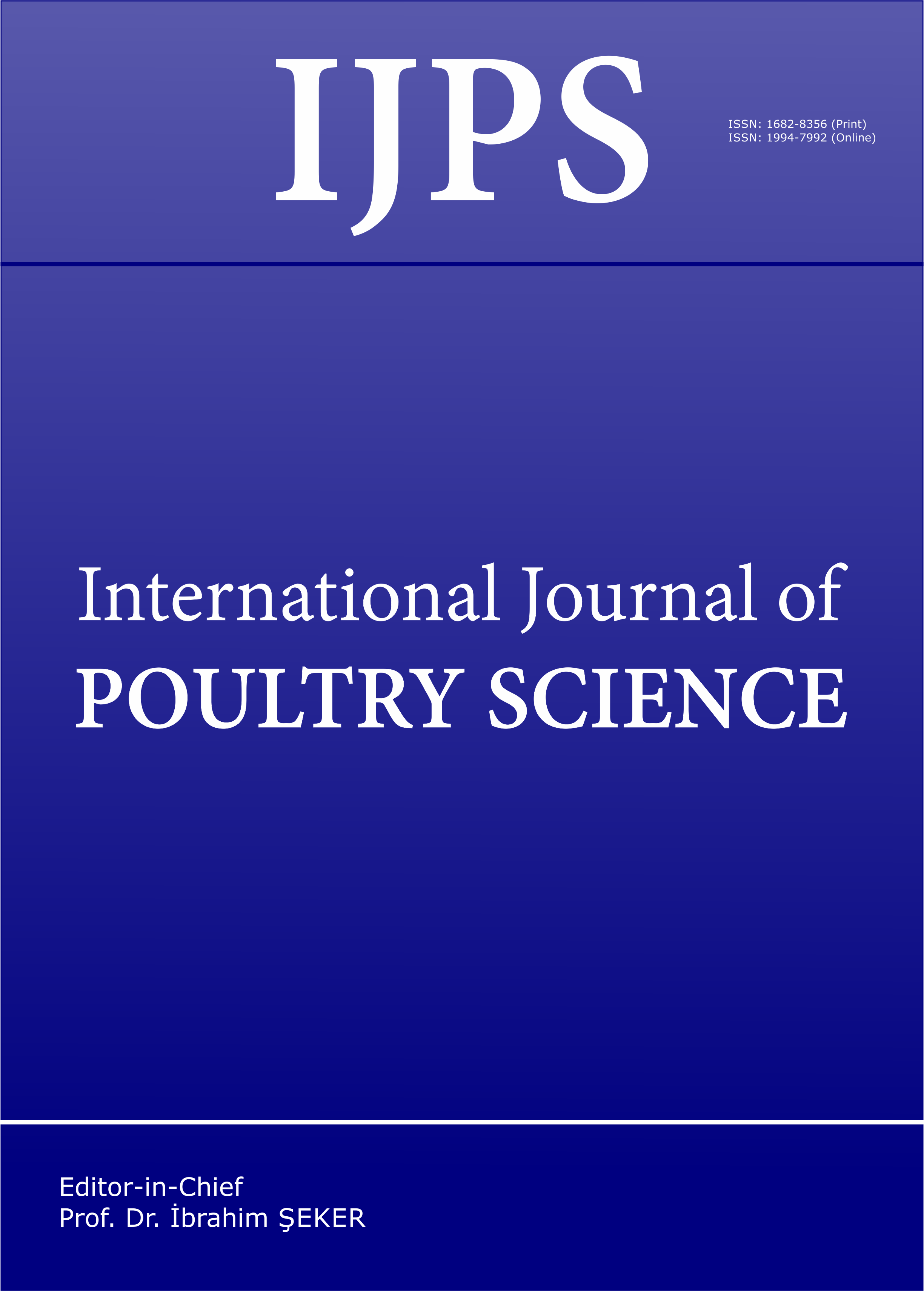Understanding Young Adults Aptitude in Poultry Enterprise
DOI:
https://doi.org/10.3923/ijps.2012.658.665Keywords:
Demographic characteristics, interest, poultry enterprise, self-concept, young adultsAbstract
The study examined the variations in interest and self-concept of young adults in vocational capacity development in agriculture. The expo facto research type based on survey research approach was adopted for the study. Multi-stage sampling was used to select 300 young adult farmers who have completed their formal training in virtually all sectors of agriculture among secondary school programmes in Akwa Ibom State, Nigeria. Of the total sample, 113 (37.7%) were female while 187 (62.3%) were male. 151 (52.2%) of the respondents lived in the urban area while 149 (47.8%) respondents lived in the rural area. The respondents responded to the three sections of standardized validated instrument. The instrument was designed to collect information on the demographic characteristics, interest and self-concept of the respondents. Data analysis involved the use of independent T-test and Analysis of Variance (ANOVA) to examine the variations in the self-concept and interest of the young adult farmers on the vocational capacity development programme by their gender, location and age. The result indicated that males had more interest and self-concept towards poultry enterprise than the females. Location did not significantly influence the interest of the respondents. Respondents between the age group of 31-35 were significantly different in their interest and self-concept as compared to other age groups. Based on the findings, it was suggested that it is vitally important that young adults, both male and female, irrespective of place or area of resident be exposed to counseling interventions geared towards enhancing the self-concept and interest of young adults in agricultural vocations. Government agencies should work towards the provision of basic amenities in the rural area to make the area attractive to the youths and by extension prevent rural-urban migration.
References
Abayomi, A., 2007. Poultry Without Tears. The Golod House Publishers, Lagos, Nigeria.
Adeoye, H. and V. Torubelli, 2011. Emotional intelligence and human relationship management as predictors of organizational commitment. Ife Psychologia, 19: 212-226.
Adeyemo, D.A., 2001. Self-efficacy and subject enrolment in secondary schools: An empiral inquiry. Ibadan J. Educ. Stud., 1: 86-95.
Afolabi, K.A. and A.I. Alarape, 2001. The impact of multiple role strain, self-efficacy and locus of Control on the psychological health of working mothers. Nigeria J. Counsel. Psychol., 7: 1-16.
Branckeart, R.D.S., L. Gavira, J. Jallade and R.W. Seiders, 2000. Transfer of technology in poultry production for developing countries. FAO Sustainable Development Dimensions, October 2000 and Proceedings WPC2000 Montreal, Canada.
Brown, J.D. and S.A. Smart, 1991. The self and social conduct: Linking self-representations to prosocial behavior. J. Personality Soc. Psychol., 60: 368-375.
Bryne, L., 1994. The general academic self-concept monological network: A review of construct validation, research. Rev. Educ. Res., 54: 427-456.
Coleman, I.I., 2000. Personality and achievement among executives learners. Int. J. Adv. Educators, 13: 14-52.
Denga, D.I., 2004. Guidance and Counseling in Schools and Non Schools Setting. Port Harcourt Double Diamond Publications, Nigeria.
Dolberg, F., 2008. A review of household poultry production as a tool in poverty reduction with focus on Bangladesh and India. PPLPI Working Papers with Number 23762. http://ideas.repec.org/p/ags/faopwp/23762.html.
Ganiyu, O., 2005. Poultry Care. Gambo and Associate Ltd., Ibadan, Nigeria.
Helmeke, A. and M.A.G. van Aken, 1995. The causal ordering of academic achievement and self-concept of ability during elementary school: A longitudinal study. J. Educ. Psychol., 87: 624-637.
Helmke, A., 1992. Self-Confidence and Scholastic Achievement. Hogrefe Publishers, Gottingen, Germany.
Ibe, S.N., 2011. Nigerian Agriculture, Global Challenges and Rural Development. In: Globalization and Rural Development in Nigeria, Nwachukwu, I. and K.C. Ekwe (Eds.). Extension Centre, Michael Okpara University of Agriculture, Umudike, Abia State, Nigeria, pp: 24-38.
Ifreke, M.N., 2001. Problems and Prospects of Poultry Farming in Akwa Ibom State: A Handbook for Agricultural Extension Workers. State Ministry of Agriculture and Natural Resources, Uyo, Akwa Ibom State.
Khomari, L., 2000. Lessons for Future Research and Development: How do We use Data to Develop a Rural P|oultry Development Programme? In: Family Poultry Research Development, Sonnaiya, E.B. (Ed.). Obafemi Awolowo University, Ile-Ife, Nigeria.
Manning, R.O. and R.D. Wyatt, 1990. Effect of cold acclimation on the broiler chicks resistance to acute aflatoxicosis. Poult. Sci., 69: 388-396.
Nwachukwu, I.N. and C.I. Ezeh, 2007. Impact of selected rural development programmes on poverty alleviation in Ikwuano LGA, Abia State, Nigeria. Afr. J. Food Agri. Nutr. Dev., 57: 1-17.
Ossom, E.M., 2004. Effects of chicken manure on soil properties. UNISWA Res. J. Agric. Sci. Technol., 8: 5-15.
Hajati, H. and M. Rezaei, 2010. The application of prebiotics in poultry production. Int. J. Poult. Sci., 9: 298-304.
Rangnekar, S., 2003. The role of women in small-holder rain fed and mixed farming in India. Proceedings of the Workshop on Women in Agriculture and Modern Communication Technology, March 30-April 3, 2003, Denmark.
Sam, O., 2006. Ministry of agriculture and natural resources trains 310 young farmers. The Pioneer Newspaper, March 8th, 2006.
Todd, H., 2003. Climbing out of poverty through credit: Or what do cows have to do with it? Proceedings of the Workshop on Women in Agriculture and Modern Communication Technology, March 30-April 3, 2003, Denmark.
Udoh, J.S., 2005. Point of Education (Principle and Practice). Ntebeco Press, Uyo, Nigeria.
Udoh, R.S., 2003. Improved techniques in poultry farming. Manual on Integrated Farmer Scheme of Akwa Ibom State.
Uko, M.N., 2000. Methods of improvement in Livestock Farming in Tropics: A Handbook of Agriculture for Students. Rapid Educational Publishers Ltd., Calabar, Nigeria.
Ukpong, T.F., 2001. Vocational preference among rural youths in Ibiono Ibom Local Government Area. Int. J. Agric. Res. Dev., 2: 77-81.
Ukpong, T.F., 2002. Poultry and youths development in Akwa Ibom State. Int. J. Agric. Res. Dev., 1: 61-75.
Downloads
Published
Issue
Section
License
Copyright (c) 2012 Asian Network for Scientific Information

This work is licensed under a Creative Commons Attribution 4.0 International License.
This is an open access article distributed under the terms of the Creative Commons Attribution License, which permits unrestricted use, distribution and reproduction in any medium, provided the original author and source are credited.

